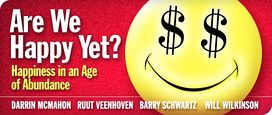I find Ruut’s argument for the centrality of happiness, even for pluralists, very persuasive. If happiness is in fact a cause of, and is in turn caused by, a number of other values we hold dear in their own right, then I’m sold. And I’m attracted to the idea of average happiness levels as a measure of the desirability of different “value mixes” as embodied in different social systems. But this is based on Ruut’s idea that happiness data carry information about the fit between human nature and different natural, cultural, and institutional environments, and I have some abiding doubts about that.
I find it plausible that life satisfaction surveys do contain real information about the quality of subjective experience. And, with Ruut, I think that positive and negative feelings are there for a reason: to guide individuals to take biologically adaptive courses of action. But, like Darrin in his initial essay, I have a hard time squaring happiness with inclusive biological fitness. I think Darrin is right that Darwinian logic leads us to expect a kind of treadmill, as Gary Becker and Luis Rayo lay out formally in this paper. Nature has no incentive to keep us happy. It doesn’t even have an incentive to keep us alive after we’ve completed our reproductive tour of duty. It only need keep us motivated to do the things that will get lots of copies of our genes into future generations. If Nature needs us to keep doing certain kinds of things again and again, then we should expect many motivating but fleeting pleasures. But we can’t even expect that we’ll actually get any pleasure, as long as our minds can consistently trick us into believing we will. Thus we should not be surprised to discover, for example, that we tend to think that having a brood of children will be richly rewarding and deeply satisfying, even if the hedonic gains from parenthood max out after the first child.
So I wonder where this leaves the idea that happiness levels tell us something about the fit between human nature and different social environments, and about the quality of different value mixes. Wouldn’t birthrates be a better indicator of accord with our evolved natures? And don’t many of the happiest societies in the world — wealthy, liberal, democratic, commercial societies — have sub-replacement birth rates?
My guess is that the kind of richly-textured, meaningful happiness most of us aspire to isn’t so much a matter of our living in accordance with our evolved human nature as it is a matter of tricking our evolved nature into give us something that we want, but which it is ultimately indifferent to. I think it’s useful here to imagine a bodybuilder who sculpts his physique in ways nature never intended by artfully turning the body’s propensity to create new muscle to his own vain purposes. The kind of happiness we want is like that.
It is not obvious that air-conditioning makes us better off biologically, but it sure does make us more comfortable, whether or not we even notice or appreciate the fact we’re no longer sweating — whether or not this comfort gives us longer lives or bigger families. We can experience “flow” — the sense of meaningful efficacious engagement — from activities completely foreign to our original evolutionary environment. We are not “designed” to swing tennis racquets and the written language is completely “unnatural,” but we can nevertheless take a great deal of satisfaction from tennis tournaments and novel-writing. And we can develop strategies that evade or overpower the Darwinian logic of the hedonic treadmill. For example, we can create technologies of novelty that deliver a rapid, steady stream of fleeting pleasures, which is almost as good as sustained pleasure. Or we might learn that some forms of experience are less prone to adaptation or “set-point” reversion than others, and use this knowledge to train ourselves to work, play, and consume in patterns more likely to produce lasting satisfaction. Happiness derived in this way strikes me, like Mr. Universe’s pecs, as more like art and less like the fulfillment of our nature.
Some evolutionary psychologists seem to think [pdf] we must be miserable because life in San Diego is so far from life on the savanna. I happen to think this “ecological mismatch” view fails to take fully seriously how one of our key, distinctive biological adaptations — our capacity to culturally transmit and absorb social practices, norms, and attitudes over generations — ensures that humans will be capable of finding a dizzying diversity of environments perfectly natural. But it is not clear to me that social systems that leave us with higher levels of happiness are therefore better fitted to human nature. It seems to me that they are simply better at inducing human nature to produce happiness. If Ruut is right, and happiness is a central part of an interconnected web of values, each strand of which we have reason to independently prize, then it seems we have more than enough reason to specially prize these social systems over others. But I don’t think we need to buy the idea that happiness is an indicator of a good fit between human nature and human environments. To be sure, a high average level of happiness indicates that the human environment is well-suited to milking happiness from human nature, but that’s not the same thing.

